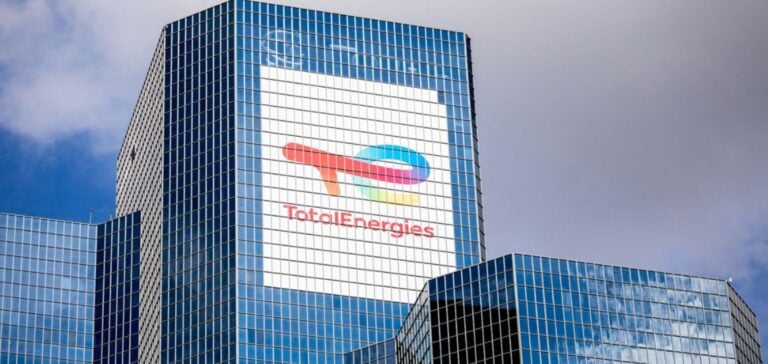TotalEnergies reached a major milestone this week by achieving 2 GW of renewable electricity generation capacity, marking a significant step forward in its energy transition strategy. This milestone was reached with the inauguration of the Vents de la Moivre wind farm in the Marne region, now France’s largest wind farm with a capacity of 63 MW. With this new facility, TotalEnergies is strengthening its commitment to renewable energies and consolidating its position as a leader in France’s energy transition.
Diversification and strategic investments
Present in wind power, solar energy, storage capacity and small dams, TotalEnergies is banking on strategic diversification to transform its business model, which has historically been based on fossil fuels. The Group invested nearly $400 million in renewable energies in 2023, with the aim of producing over 4 TWh of green electricity by 2030, compared with 2.6 TWh produced in 2023. This diversification strategy is crucial to achieving climate objectives and meeting the growing expectations of investors and climate activists. Isabelle Patrier, Senior Vice President, France, TotalEnergies, explains:
“We weren’t into electricity at all” just ten years ago. And “in all areas where the company is present, we aim to deploy our renewable electricity production on a fully integrated chain: production, storage, distribution”.
Collaboration and project development
TotalEnergies is now developing its own renewable energy projects, after initially purchasing existing wind farms. With some 600 specialized employees in France, the group works closely with local authorities, farmers and industrial customers to deploy innovative energy solutions. Partnerships with companies such as Renault Trucks and L’Oréal in rooftop solar power illustrate this collaborative, local approach. For example, solar panels installed on the roofs of Renault Trucks plants supply clean electricity directly to industrial operations, reducing their carbon footprint.
Ambitious global targets
Worldwide, TotalEnergies has a gross renewable electricity production capacity of 22 GW at the end of 2023, with an ambitious target of 35 GW by 2025 and a net production of over 100 TWh of green electricity by 2030. These objectives demonstrate TotalEnergies’ determination to play a central role in the global energy transition. However, the Group remains criticized for its continued investment in fossil fuels, particularly LNG, with plans to increase hydrocarbon production by 2-3% per year over the next five years. In 2023, 90% of TotalEnergies’ sales were still from gas and oil, with only 8% from electricity, although the aim is to increase this to 15% by 2030.
The challenges of the energy transition
The challenge for TotalEnergies is to reconcile economic growth with environmental sustainability. Although the Group is the most involved in the energy transition among the oil majors, with a third of its investments devoted to low-carbon energies, it faces ongoing criticism for its contributions to greenhouse gas emissions. The think tank Carbon Tracker recently noted that only Italian oil company Eni had emissions reduction targets potentially aligned with the Paris agreement, placing TotalEnergies in second place ahead of Repsol and BP, but far behind Aramco and ExxonMobil.
Patrick Pouyanné: leadership and controversy
Patrick Pouyanné, CEO of TotalEnergies, is at the heart of this transformation. Having arrived at the head of the group in 2014, he oversaw the company’s diversification and name change to reflect its new focus on renewable energies. However, Pouyanné remains a controversial figure, criticized for his decisions regarding investments in hydrocarbons, his continued presence in Russia at the start of the war in Ukraine and the possible transfer of the Group to the New York Stock Exchange. This hypothesis has been strongly criticized in France. Despite the pressure, Pouyanné firmly defends the company’s strategy, arguing that global energy demand continues to rise and that the transition to 100% renewable energy will take time.
TotalEnergies is positioning itself as a key player in the energy transition, with massive investments and a strategic diversification of its activities. Nevertheless, continued investment in fossil fuels is provoking debate and criticism. The challenge for TotalEnergies will be to reconcile economic growth with environmental sustainability, while meeting the expectations of its investors and climate activists.






















